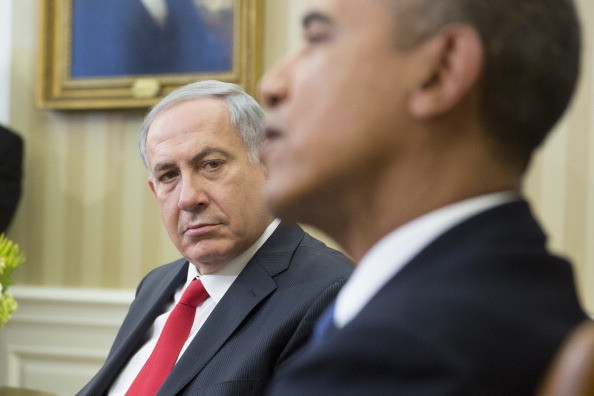How US Midterm Elections Could Decide Israel's Future

The midterm US congressional elections will be closely scrutinised with apprehension by a long time Washington ally which has become grumpier in the past few years: the state of Israel.
It is no mystery that Prime Minister Benjamin Netanyahu is desperately rooting for US Senate to fall in the hands of the Republicans, who already hold a 17-seat majority in the House of Representatives. Recent polls have shown that President Barack Obama, who never hid his enmity towards the right-wing Likud leader, had his approval ratings dipping to 38%.
Israel's diplomatic envoy to the US, Ron Dermer, has repeatedly held meetings with Republican lawmakers to try to influence the electoral campaign. Netanyahu's main purpose at a time when diplomatic relationships between the US and Israel reached rock bottom, is to prevent an historic agreement with the Jewish state's arch-enemy, Iran, on its nuclear program.
The elections happen only three weeks before the end of the period dedicated to negotiations between Iran and six world powers, and just five days before the summit meeting of US Secretary of State John Kerry, Iranian Foreign Minister Mohammad Javad Zarif and outgoing EU Foreign Policy Chief Catherine Ashton.
Haaretz newspaper reports that Netanyahu will probably lobby directly in Congress against any deal with Iran, should Republicans win the majority of seats, in order to maintain the status quo of sanctions on the Islamic Republic.
The chickenshit-gate
However, the so-called "unbreakable" bond between the US and Israel has already been strained by a senior Obama administration official who referred to Bibi - Netanyahu's nickname - as a "chickenshit" in an interview with Jeffrey Goldberg on the Atlantic.
Never before in their decades-long friendship have the two allies exchanged such heated words. In response to State Department spokeswoman Jen Psaki, who said that Jewish settlements in the occupied West Bank and East Jerusalem are "incompatible with the pursuit of peace", Netanyahu said that whoever criticises Israeli expansion plans are "disconnected from reality".
Last week, a former national security adviser to Netanyahu, Yaacov Amidror, said that "relations between Israel and the US have deteriorated to an all-time low".
Along with the Iranian nuclear deal, Netanyahu fears that US president Barack Obama will lift the ban on the veto given to Israel at the UN Security Council, according to a recent report on Maariv newspaper.
The Israeli paper quoted an Israeli politician as saying: "Obama intends to abandon Israel as it faces the UN Security Council in an effort to block Israel's decision to build on Palestinian territory that has been occupied since 1967."
Isolated, shunned
Palestinian President Mahmoud Abbas is planning to go to the Council with a draft resolution urging Israel to pull out from all settlements beyond the green line by November 2016.
Washington vetoed any resolution condemning Israeli settlements until now but things can change after the Congressional vote. Israel may find itself isolated in the international arena without US support, to the point of feeling even threatened on its own existence.
The Israeli PM allegedly told a small circle of confidants that Obama plans to abandon Israel at the UN. "This step was what Israel feared the moment Obama was re-elected and here it is happening today," Netanyahu added, according to Maariv.
"Obama intends to destroy the most sacred of holy relationships between Israel and the United States and he intends to use the US veto against Israel at the UN. Without the power of the US veto, Israel would not be able to stay," the paper.
"There should, in fact, be nothing that threatens the nature of the relationship between the United States and Israel. If Israel cannot rely on the United States, this would require a change in the foundational structure of Israel's security and international relations platform.
"The power of the US veto is what has ensured Israel's stability in the region thus far and it remains essential to its position within the region, as it has been in past agreements with Egypt following the 1973 war," the report continued.
Midterm strategy
Goldberg on the Atlantic speculated that the US will still try to block Abbas's bid to have Palestine recognised as a state in the Security Council, "but it might do so by helping to craft a stridently anti-settlement resolution in its place".
"It would also be unsurprising, post-November, to see the Obama administration take a step Netanyahu is loath to see it take: a public, full lay-down of the administration's vision for a two-state solution, including maps delineating Israel's borders," he wrote.
The outcome of midterm elections plays into this strategy. According to Shmuel Sandler, expert on American foreign policy, if the Democrats win they could launch a daring attempt to "shun Israel at Turtle Bay".
But if they are defeated, he told The Times of Israel, John Kerry could be replaced and the whole US strategy of seeking a peace deal between Israel and Palestine could change abruptly. The Democrats will likely concentrate on the 2016 presidential elections instead, abandoning any ground-breaking initiative in favour of the Palestinians.
© Copyright IBTimes 2025. All rights reserved.






















